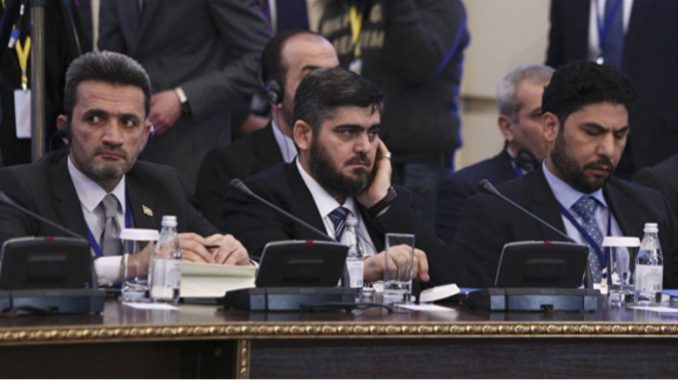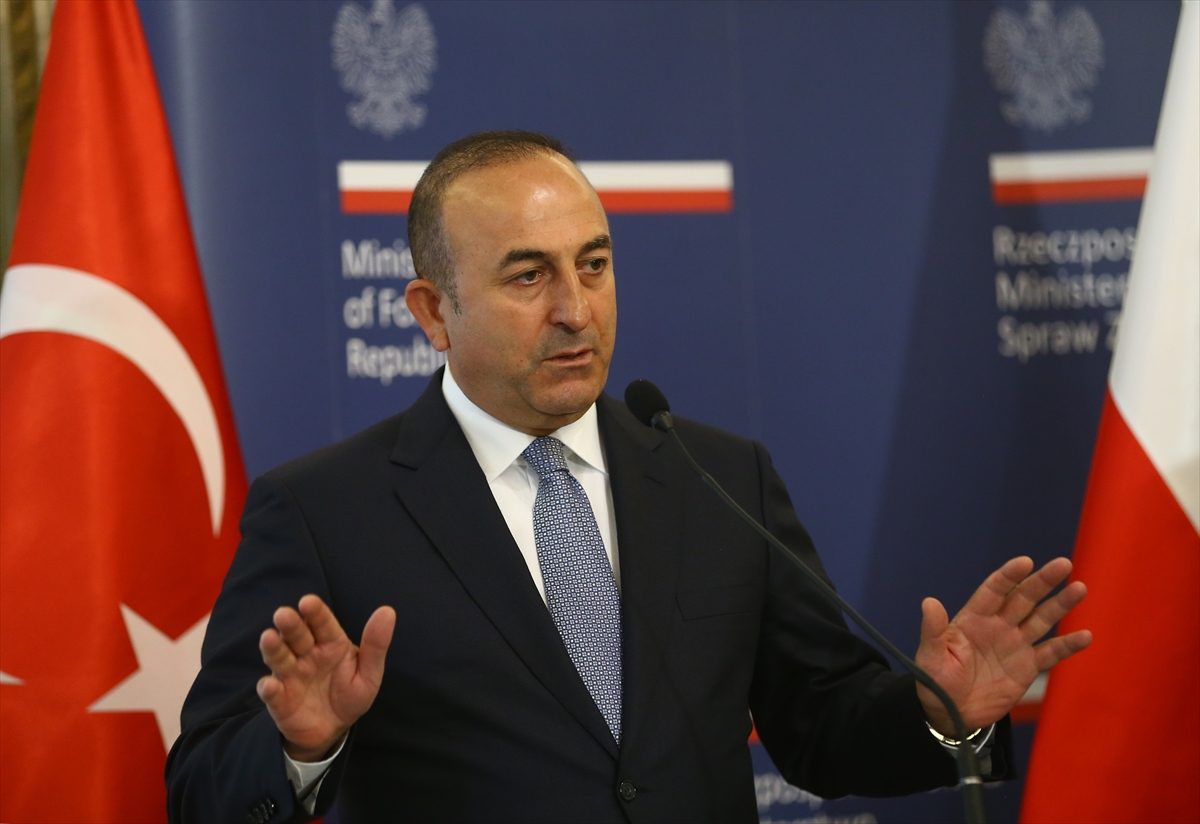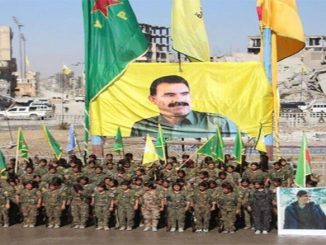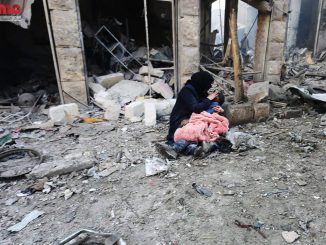
The list of Syrian Opposition’s delegation to the upcoming peace talks in Geneva includes 21 names, including Mohammed Alloush from the Jaysh Al-Islam group and representatives of rival political groups.
Russia, Iran, and Turkey said they were ready to help broker a Syria peace deal, and organized peace talks meeting in Kazakhstan on January 23.
The talks have ended with Russia, Turkey, and Iran making a joint statement about the consequences of the talks and agreeing on a mechanism to support a delicate ceasefire and to support a new round of peace talks in Geneva.
The Syria peace talks had been planned to begin in Geneva on Feb. 8, but the UN envoy for Syria, Staffan de Mistura, said that he had decided to delay the UN-sponsored talks until February 20. in order to take advantage of the results of Astana talks.
With this delay, he also gave the both parts more time to choose their policy and delegations.
The UN wants all the groups that describe itself as opposition t be represented in one delegation, a goal that seems hard to reach as huge differences pose itself between them. Therefore, selecting the HNC for the delegation from among its allies may be not accepted by the UN.
Other than the HNC, there are many other groups that are considered by the UN to be among the opposition including the Kurdish political wing of the YPG forces, the Cairo platform, and the Damascus platform which is backed by Russia.
These groups have doesn’t share the HNC’s view of Syria’s future and have been accused of hindering the political process. Damascus group, for example, is said to unify the opposition figures inside the country. Most of them refused the revolution when it started and formed their delegation after the UN started its political efforts to end the war. The group is supported by Russia, accepts the idea of Assad being in power and back the Russian air campaign against Syrian civilian saying its aim is fighting terrorists.
Final list of the delegation agreed
The Syrian opposition High Negotiations Committee (HNC) on Monday announced the final composition of the delegation that will participate in the forthcoming round of intra-Syria talks in Geneva, an HNC spokesman said.
Salem Muslit confirmed that the list included 21 names, including Mohammed Alloush from the Jaysh Al-Islam group.
HNC spokesman Salim al-Muslit said the opposition delegation would bring together various groups, which, as well as the HNC would include rebel factions that took part in Astana negotiations. It will also include Kurdish, Turkmen and Christian representatives, he said.
The new 21-member negotiating team included members of two dissident alliances, the so-called Moscow and Cairo groups.
The Syrian opposition also declared it is fully committed to peace talks in Geneva on Feb. 23, adding the talks would need to pave the way for a political transition.
“We are fully committed for the Geneva talks,” Syrian National Coalition President Anas al-Abdah told delegates at the Munich Security Conference. “We cannot address the profound security threats … while Assad remains in power,” he said.
Refusal of other groups
However, the so-called Moscow group insists on equal rights with other participants of the Geneva talks and is not planning to accept a status of advisers as proposed by the United Nations Special Envoy for Syria, Staffan de Mistura, representatives said.
“Seems the United Nations decided to invite this time only two platforms – HNC and Cairo group. This can make the talks more substantial and serious. It looks like the world community and especially those countries that have influence on the situation in Syria have decided to conduct more serious talks now,” Mahmoud Afandi, secretary of the opposition Popular Diplomacy Movement said.
“It is still unclear if we participate in the Geneva talks as the conditions are not yet ripe,” said Qadri Jamil, who is also leader of Syria’s Popular Front for Change and Liberation. “The invitation that De Mistura has sent to us is ambiguous and unclear.”
“We are discussing this situation. We will come if he invites us as a delegation having equal rights with the Riyadh group, since no single delegation has been created. But no way as guests and advisers,” he said, adding that “everything will be clear by the end of the day.”
The Cairo group has also previously seemed not satisfied with its inclusion in the delegation, as its spokesman, Firas Khalidi, said that the group wasn’t consulted before the HNC chose one of its members, reflecting divisions among the group itself.
Firas Khalidi said that the Cairo group would like to settle this matter before the peace talks.
“Khaled Mhameed is a member of Cairo group, but he attended the forum in Riyadh as a private party, the Riyadh group cannot [make] our representative [attend] without consulting us,” Firas Khalidi said.
Creating diversity and hindering the political process
Recently, members of various factions of those platforms met with Russian Foreign Minister Sergei Lavrov in Moscow and discussed among other issues the possibility of forming a single delegation for Geneva.
The HNC General Coordinator Riyad Hijab did not attend the meeting in Moscow, hinting at the HNC’s refusal of Russian intervention in the opposition’s matters and its efforts to plant members that want to implement its vision.
Damascus platform’s spokesman Tarek Ahmad said that forming one group for the upcoming talks is impossible.
“I don’t think that Syrian opposition groups are capable of presenting a list of single delegation of opposition before the talks in Geneva as we lack unity among us,” Ahmad said, pointing out that only under the pressure of the three guarantor countries or the United States the opposition forces could work out a united list.
The Damascus Platform may propose its own delegation of Syrian opposition forces and civil society members from inside the country for the upcoming Geneva reconciliation talks, Ahmad said.
“We are going to have a meeting of the Damascus Platform soon and may discuss an idea of proposing a list of our own delegation of civil society members and opposition forces from inside the country to Staffan de Mistura’s office ahead of talks in Geneva,” Ahmad said.
The accusations for these groups of hindering the political process and having other agendas other than what Syrian civilians want may be true as Ahmad said: “a new round of settlement negotiations would be useless unless the civil society members were invited to participate.”
“If we want to discuss Syrian future, the new Syrian constitution or reforms, the proposed format — opposition versus the Syrian government — is unlikely to bear fruits. We need a third group which will include civil society, independent representatives as well as tribes. All these groups are included in the Damascus platform,” Ahmad pointed out.
Cairo opposition group said also that a joint delegation is unlikely to be achieved soon.
It will be wise if we go to Geneva in one delegation, but it is not a near target to achieve now. It needs lots of work, and it needs regional and international understanding in order to achieve it,” Jamal Suleiman, the group’s representative, said.
“If there are some countries that are in favor of this idea, and others are not, I don’t think it will be realistic. Unfortunately, many opposition fronts are allied to certain countries. So they don’t make independent decisions in cases like this,” he added.
The Syrian crisis began as a peaceful demonstration against the injustice in Syria. Assad regime used to fire power and violence against the civilians and led to armed resistance. 450.000 Syrians lost their lives in the past five years according to UN estimates, and more than 12 million have lost their homes.



